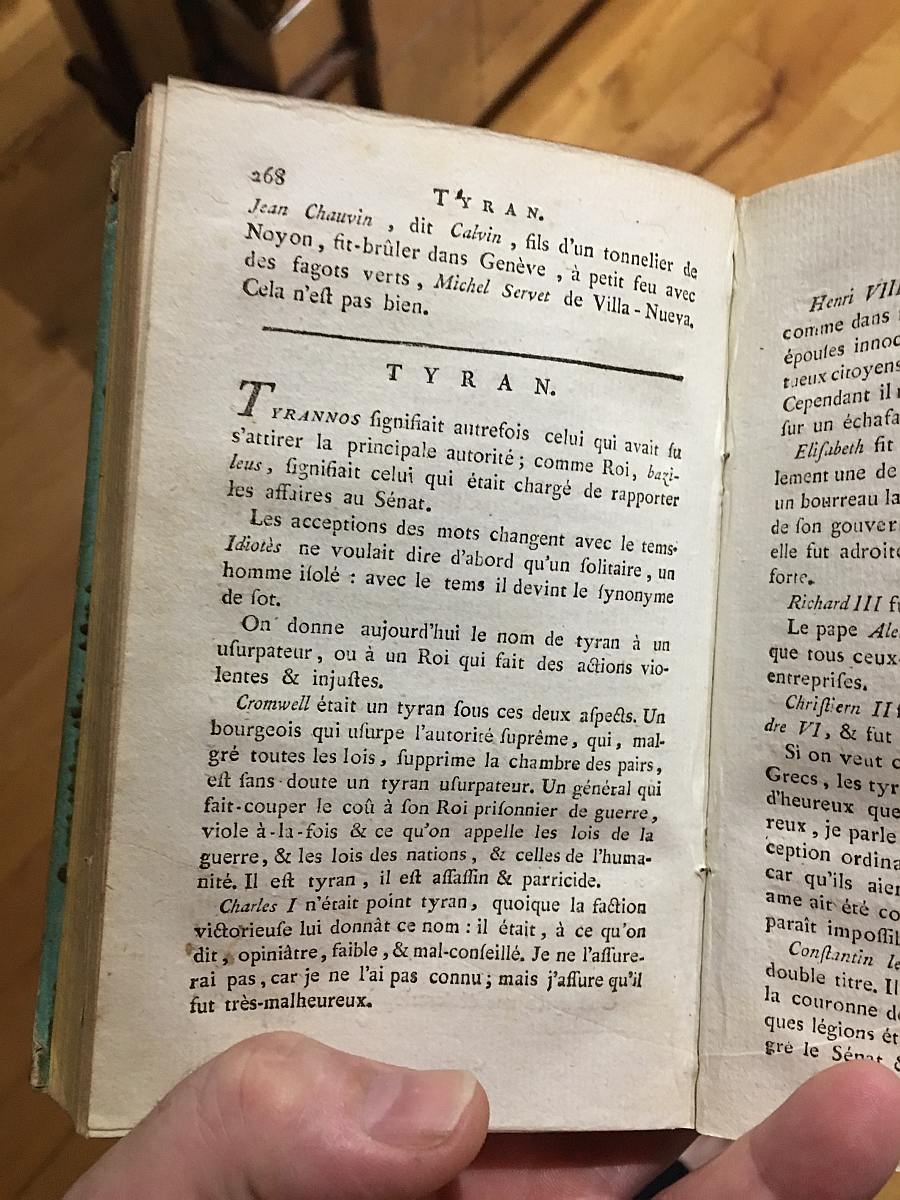
Voltaire by Houdon
“Tyrannos” used to mean a person who had achieved the highest authority; like the King or basileus, meaning the one who was charged with bringing matters before the Senate.

The accepted usages of words change with the times. “Idiotes” used to mean a hermit, a holy-man; over time it became synonymous with a sot.
Today we give the name “Tyrant” to a usurper, or to a king whose actions are violent or unjust.
Cromwell was a tyrant under both aspects of that definition. A bourgeois who usurped supreme authority, who in spite of all the laws overruled the house of Parliament, is doubtless a usurping tyrant. A general who has his king’s head cut off, when the king is a prisoner of war, has broken simultaneously the laws of war, the laws of nations, and the laws of humanity. He is a tyrant, an assassin, a parricide.
Charles I was hardly a tyrant, despite the winning faction calling him that. He was, we are told, opinionated, weak, and ill-advised. I can’t be certain, since I did not know him, but I assure you he was very unfortunate.

The US has been taken over by a petulant, corrupt, mountebank. I have to remind myself occasionally that he’s not really a tyrant, he’s just a very naughty boy. Some of the tyrants through history, from Sulla to Mussolini to Idi Amin – they were a mixed bag but they were generally smart and capable, at first, and showed their flaws most clearly once power had a chance to corrupt them.
I saw Cromwell when I was a kid, and wasn’t sophisticated yet to see him as a good guy or a bad guy. Of course, the movie portrayed a more balanced view than Voltaire does. As a member in good standing of the ancien regime (in spite of his lighting the fuse that destroyed it) Voltaire would have been automatically horrified by anyone who killed a monarch.

The US has been taken over by a petulant, corrupt, mountebank. I have to remind myself occasionally that he’s not really a tyrant,…
I am sure that he would happily be one if he could but as you say most tyrants were generally smart and capable at first.
I think what happens in most cases with tyrants is that they are overtaken by what the historian Margaret MacMillan calls hubris. and politicians in charge gradually come to think that they can do no wrong.
She suggests that this is partly what did in Maggie Thatcher and if it can happen to a democratic leader, how much easier can it happen to a full-blown tyrant?
As some relative unknown once said “l’état, c’est moi”. While more or less true it does sound like hubris and the last 15 or 20 years of his reign seems to bear this out.
Some tyrants seem to avoid hubris. I get the feeling both Fidel Castro and Stalin avoided it. Of course avoiding the daily assassination attempt in Castro’s case and fighting the Great Patriotic War in Stalin’s may have reduced the chances of succumbing to hubris.
“Idiotes” used to mean a hermit, a holy-man; over time it became synonymous with a sot.
The Little Volunteer’s etymological reference disagrees with Online Entymology‘s:
2 Pierce R. Butler
Re “idiotès”. Well Voltaire did not have had the advantage of modern linguistic scholarship and he was writing in French where, originally, the term may have had that meaning.
BTW, what does one call those letter “s”‘s that look like an “f”?
A year or so ago I was trying to read the memoirs of a Frenchman who spent roughly seven years in New France just before the Fall of Québec and between my lousy French and those blasted “s”‘s I gave up.
jrkrideau @ # 3: … in French where, originally, the term may have had that meaning.
Etymonline does trace its word-history through French – but they may well have followed a different trail than did Voltaire’s source(s). I can’t help but suspect he may have conflated “holy man” and “sot” just for a dig at the clergy.
Funny, I wondered just a day or two ago about that elongated “s” and whether it disappeared as part of the post-Revolutionary backlash against the British in this country. Problem with that hypothesis is, sfaict, they seem to have given it up circa 1800 in the scepter’d isle as well. I wish I had a clue how to look up what they call that thing so as to snoop around a little more…
See Wikipedia article on “Long s”.
@ 4 Pierce R. Butler
I can’t help but suspect he may have conflated “holy man” and “sot” just for a dig at the clergy.
How can you say such a thing about Voltaire?
Pierce R. Butler@#2:
I wasn’t sure what was going on there, and it’s not like Voltaire to make a mistake about language. The modern French version of the word “idiot(e)” is not spelled with the accent grave (è) and trailing ‘s’ – I was thinking he might be making a reference to some ancient Greek word especially given his earlier use of “basileus”
I tried to translate it as well as I could.
The ‘ff’ is pronounced as an extra sibilant ‘s’ in vintage French. For example “feffes” is “fesses” which is pronounced sort of like “faysey” (that’s “asscheeks” in case you were wondering) I’ll note that my 2nd edition of Paine also has the long ‘s’
jrkrideau@#6:
(Giggle)
He’d have enjoyed your comment.
#5 rs2718282
Thanks, I am surprised I never thought to that myself, duh.
So if I understand the issue it was “simply” a decision by a font designer that gradually overtook the publishing world?